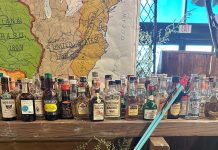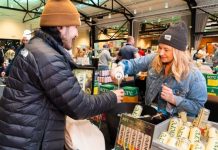The made-in-U.S.A. movement is thriving, and showing no signs of slowing. At the same time, eco-conscious fashion is continuing to be a relevant initiative. Zady, a conscious e-commerce site, is the perfect storm of both. Founded by Minnesota natives Maxine Bédat and Soraya Darabi, Zady sells goods from 70 companies that meet their rigid standards, promising transparency when it comes to where and how each product it sells is made. The company even has a “We The People” petition to have the U.S. government mandate that all products sold in the country provide supply chain details with a new “Sourced In” tag.
Since it launched a little over a year ago, the site has launched several exclusive collaborations with its designers, operated a pop-up shop at LaGuardia Airport, and landed high-profile press in Fashionista.com, LuckyMag.com, and Forbes.com.
This week marks the New York-based brand’s first foray into manufacturing. Its first private label product, an organic wool women’s sweater featuring a tuck-stitch pattern and slight boyfriend cut, debuted this week. Available in three colors–natural, light grey, and charcoal–the sweater is the perfect three-seasons layering piece.
And, accordingly, the making of the sweater is exposed to the public, with specific details and behind-the-scenes photos and a process video. The made-in-America, sustainably-created operation started with organic wool sourced from Imperial Stock Ranch in Shaniko, Oregon; treated in Jamestown, South Carolina; dyed and spun at G.J. Littlewood & Sons in Philadelphia; and finally knit by Ball of Cotton in Commerce, California. Priced at $160 (on par with J. Crew), the sweater can be purchased exclusively on Zady.com.
I chatted over the phone recently with the entrepreneurs about their decision to promote sustainability and American manufacturing, why they decided to make the jump to creating a private label, and how their Minnesota upbringing has influenced Zady.

Zady’s founders Maxine Bédata and Soraya Darabi
Can you tell me a little about your respective backgrounds?
Soraya: I have a media technology background–I worked with the New York Times for two years launching its digital media department. We focused on partnering with small startups to help evangelize the brand of the New York Times to appeal to young people. It was a dream job, and allowed me to meet a lot of entrepreneurs. I caught the entrepreneur bug and joined a startup in New York which was quickly acquired; all the while I was volunteering for nonprofits. I believed then and now the power of online communities to make an impact on the world.
Maxine: My background is in the development world and international law–I’m actually a lawyer by training. My family is South African, and I was going home and seeing for the first time how things are actually made and that made a huge impact. That was the impetus to create the Bootstrap Project, to give the craftsman the ability to overcome poverty and preserve their craft traditions. When that got off the ground and I reconnected with Soraya, we started thinking about a broader movement in fashion that would allow us to be more conscious about what we’re buying. That’s when Zady was born.
What attracted you to e-commerce initially?
Maxine: For us, we are digital natives and part of the Millennial generation so starting something online is very natural for us and a great way to communicate and be able to tell stories. You can do things through multimedia. For us it was very natural to be an online-first company, but having said that, we’re physical beings, so that is the direction of Zady–we asked ourselves, How do we best tell stories in both online and physical world?
What brought about your decision to make the site be both locally-sourced and eco-conscious as well as handmade and made in the U.S.? How do the two distinctions tie together?
Soraya: With fair-trade and organic products, people understand they’re paying a premium for that. Some people value things that are made in the U.S.A. With clothing, we want to focus the aspects that we thought were exceptional and important. Many of our customers want to know when things are environmentally conscious. Some people slap a label that something is green without it actually being green.
Maxine: It was going back to the conscious consumer–paring back to what we really care about, those were the things that matter. It’s the imprint we making on society, it’s the quality of the products. Those badges (referring to the site’s badges “Locally Sourced,” “Made in the USA,” “Made by Hand,” “Sustainable,” and “High Quality”) mark what the conscious consumer cares about.

Zady’s .01 The Sweater in natural
Why did you decide to make the jump into producing your own line?
Soraya: It was in our business plan since day one. We knew that to really have a product that meets our standards, we need to understand the process ourselves. By telling the stories of other exceptional makers, we built a brand that people understand. If you read the stories about the 70 companies Zady carries, you can understand how they’re connected because they have the same mission.
Maxine: For us to really tackle the environmental challenges that the apparel industry is such a big part of, we had to get our hands dirty and understand the process. We hear about the makers that come at the end of the process, but there are farmers and washers and dyers, and so many steps that have a significant environmental impact. In order to tackle those very big issues, we had to really go back all the way to the farm, and say, What does it mean to have a sustainable farm? for every step in the supply chain, so we can have a product that is sustainable and luxurious.
Has your upbringing in Minnesota had an effect on your business, inspiration, aesthetic?
Soraya: It absolutely did. Maxine and I share so much in common–we come from international parents, which Minnesota has a lot of–and we pride ourselves on having strong Midwestern values. You look at our company, that we’re a mission-driven brand, and there are so many wonderful mission-driven organizations where we grew up. My first-ever internship was working at Minnesota Advocates for Human Rights. That was my first eye-opening moment. We were so privileged to grow up in a state that’s economically stable and diverse. There are human rights endangerments involved with apparel.
Where do you see Zady in one year, in five years?
Soraya: We certainly have high hopes for the collection. For us, we’re seeing from the community building that people are looking for this, they want their buying decisions to mean something. They want their dollars to mean something. We expect and are excited for that to grow across the country.
Maxine: What is very exciting for us, since we’re online predominantly, is to get emails every day from friends of friends, saying, We saw someone walking around with a Zady tote! We eventually want to host pop-up shops in other cities.

Zady’s .01 The Sweater in light grey, detail

Zady’s .01 The Sweater in charcoal
[All photos courtesy Zady]






